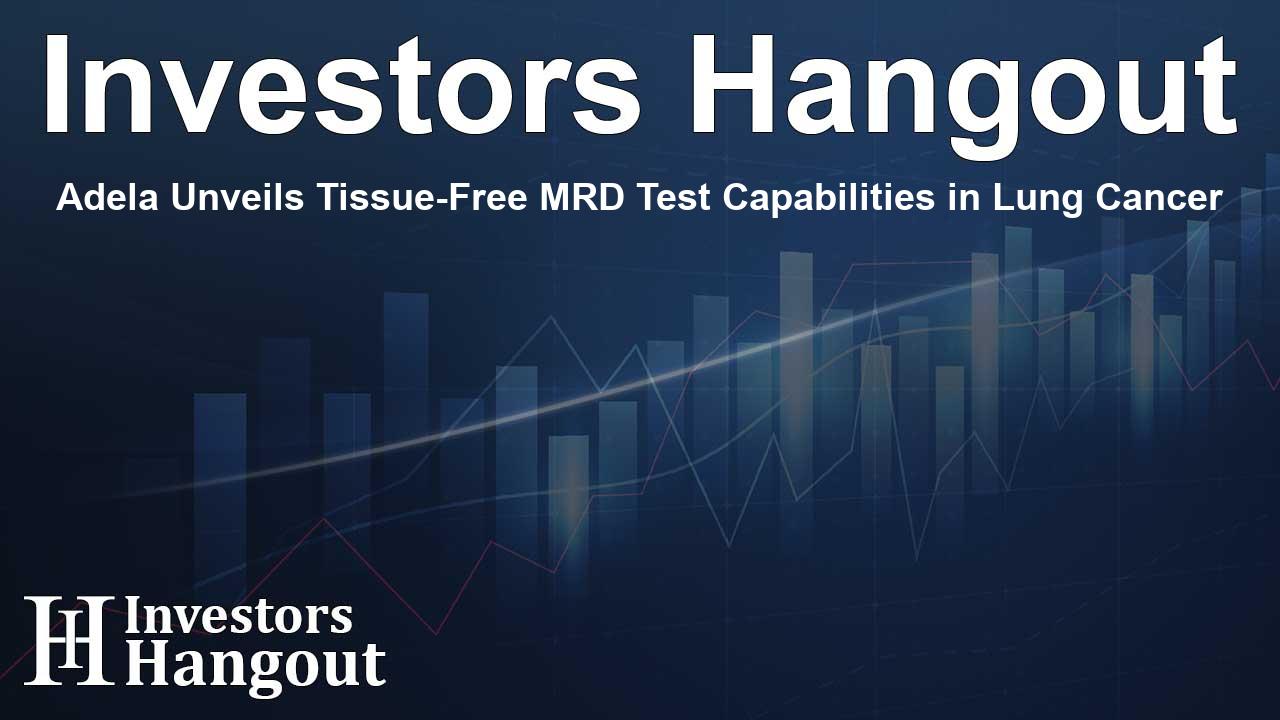Adela Unveils Tissue-Free MRD Test Capabilities in Lung Cancer

Understanding the Breakthrough in Lung Cancer Detection
Adela, Inc. is making significant strides in cancer care with its innovative blood test for molecular residual disease (MRD). This proprietary technology leverages genome-wide methylome enrichment to aid in early cancer detection and ongoing monitoring. At a recent American Association for Cancer Research (AACR) event, Adela showcased compelling data that demonstrates its MRD test's ability to predict recurrence in early-stage non-small cell lung cancer. Such advancements are critical as they aim to enhance patient outcomes through timely intervention.
Examining the MRD Test’s Capabilities
The MRD test from Adela represents a significant evolution in cancer monitoring for several reasons. Primarily, it is a tissue-free approach that depends solely on blood samples. This is groundbreaking for lung cancer patients, as studies reveal that around 40% of these individuals lack sufficient tumor tissue for traditional MRD assessments. The ability to detect recurrence without the need for tumor samples broadens access to this vital testing.
In research conducted with 136 samples taken from 24 patients diagnosed with stage I-II non-small cell lung cancer, the test was able to identify cancer recurrences with an impressive lead time. Specifically, it detected recurrences as much as 35.9 months ahead of standard clinical exams and imaging, averaging around 16.6 months earlier. This could potentially revolutionize how healthcare providers approach treatment decisions.
Insights from Clinical Validation
Adela's Chief Medical Officer, Dr. Anne-Renee Hartman, expressed optimism regarding the findings, pointing out how the results underline the test's efficiency in detecting recurrence prior to the traditional methods. Not only has the test shown promising outcomes in lung cancer, but it has also been validated in other cancer types, such as head and neck cancers. This reinforces the reliability of Adela’s methylome enrichment platform for various applications.
Currently, the MRD test is available for research purposes, allowing biopharmaceutical companies and other researchers to utilize it in biomarker discovery and drug development initiatives. Adela has plans to commercialize this test in 2025 for use specifically with head and neck cancer patients who have undergone treatment, regardless of their HPV status, further amplifying its potential impact on patient care.
Presentation Highlights and Future Directions
At the AACR Annual Meeting, Adela presented their findings under Abstract #: 3249, titled "The Development of a Tissue-Agnostic Genome-Wide Methylome Enrichment Assay for Lung Cancer." The presentation highlighted the adaptability and effectiveness of their technology in a real-world clinical context.
Moving forward, Adela aims to leverage its novel approach to not only enhance cancer detection but to improve overall treatment modalities. By enabling early detection of recurrences, doctors may find new opportunities to tailor treatments, potentially leading to improved survival rates and better quality of life for patients.
About Adela and Its Commitment to Cancer Care
Adela is poised to transform the landscape of cancer diagnostics with its groundbreaking technologies aimed at improving the management of cancer through innovative blood tests. With a focus on reducing dependencies on tumor tissue samples, Adela’s approach facilitates broad access to MRD testing and multi-cancer early detection. Through an efficient collection of relevant genomic data from the methylome, the company presents a more thorough strategy for identifying cancer signals in the bloodstream compared to traditional methods that focus on fewer genomic regions.
With a host of esteemed investors backing its initiatives, including F-Prime Capital and Labcorp, Adela continues to lead in cancer research and patient monitoring. This commitment to innovation not only promises advancements in technology but, more importantly, symbolizes hope for numerous patients navigating the challenges of cancer.
Frequently Asked Questions
What is Adela's MRD test designed to do?
Adela's MRD test aims to detect cancer recurrence in patients, particularly in early-stage non-small cell lung cancer, using a blood-only approach.
How does the MRD test differ from traditional methods?
The MRD test does not require tumor tissue samples, making it accessible for patients who may not have sufficient tissue available for traditional evaluations.
What were the results of the recent study presented by Adela?
The study demonstrated that Adela's test could predict recurrences up to 35.9 months earlier than standard clinical examination and imaging.
What are the future plans for Adela's MRD test?
Adela plans to commercialize the test for use in patients treated for head and neck cancer starting in 2025, expanding its impact on cancer diagnosis and treatment.
Who has invested in Adela?
Adela is backed by various notable investors, including F-Prime Capital, OrbiMed, and Labcorp, which solidifies its position in the cancer diagnostics field.
About The Author
Contact Henry Turner privately here. Or send an email with ATTN: Henry Turner as the subject to contact@investorshangout.com.
About Investors Hangout
Investors Hangout is a leading online stock forum for financial discussion and learning, offering a wide range of free tools and resources. It draws in traders of all levels, who exchange market knowledge, investigate trading tactics, and keep an eye on industry developments in real time. Featuring financial articles, stock message boards, quotes, charts, company profiles, and live news updates. Through cooperative learning and a wealth of informational resources, it helps users from novices creating their first portfolios to experts honing their techniques. Join Investors Hangout today: https://investorshangout.com/
The content of this article is based on factual, publicly available information and does not represent legal, financial, or investment advice. Investors Hangout does not offer financial advice, and the author is not a licensed financial advisor. Consult a qualified advisor before making any financial or investment decisions based on this article. This article should not be considered advice to purchase, sell, or hold any securities or other investments. If any of the material provided here is inaccurate, please contact us for corrections.
